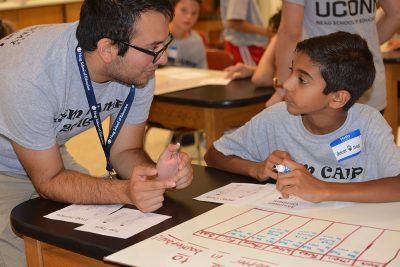
Editor’s Note: The following was originally published on the UConn Innovation Portal.
Two University of Connecticut professors have received funding from the Connecticut State Department of Education, the U.S. Department of Education’s Office of Elementary and Secondary Education, and Central Connecticut State University to create a network to develop training for science and preservice educators.
In collaboration with their partners, Todd Campbell, professor of science education and David Moss, associate professor and director of global education for the Neag School, have established the Connecticut Network for Science Educators and Preservice Teachers (CoNSEPT). This network brings together all members of the science education community responsible for training preservice science teachers to discuss and create common activities as part of professional learning communities.
CoNSEPT brings together all members of the science education community responsible for training preservice science teachers to discuss and create common activities as part of professional learning communities.
These discussions and activities will be guided by the reform initiatives established by the Framework for K-12 Science Education and Connecticut’s Next Generation Science Standards (NGSS). The NGSS are designed to ensure students understand core concepts and participate in and comprehend the value of the collaborative elements of scientific research and practices.
The initial training for the CoNSEPT program will be completed on an online platform called Next Generation Science Exemplar (NGSX), which will be complemented by an in-person engineering learning opportunity, ORTIS.
ORTIS is a professional development platform that allows teams of science teachers to focus on integrating engineering practices into other sciences using an engineering design process (EDP) to guide project-based learning activities that could be incorporated into the K-12 Science Framework.
Engineering practices are one of the core pillars of NGSS standards as they provide students with a clearer understanding of the idea of scientific “inquiry” and the range of skills and diversity of thought it requires. These practices require students to ask questions, define problems, develop and use models, analyze and interpret data, use mathematical thinking, and communicate findings.
The second phase of the project will go on to ensure that all preservice science teachers are equipped with the tools necessary to teach science to K-12 students in the 21st century.
Campbell’s areas of expertise include science education, secondary education, formal and informal science learning, and teacher education and professional development. Campbell received his Ph.D. in curriculum and instruction-science education from the University of Iowa in 2004.
Moss specializes in global and international education, study abroad program design, environmental education, curriculum studies, and teacher education. He received his Ph.D. in education from the University of New Hampshire.
Access the original post on the UConn Innovation portal.
 Facebook
Facebook
 Twitter
Twitter
 LinkedIn
LinkedIn
